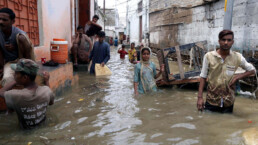After devastating floods this year, Pakistan is demanding that Western nations account for their role in climate change.
by Tanupriya Singh, The Bullet
Even as the floodwaters have receded, the people of Pakistan are still trying to grapple with the death and devastation the floods have left in their wake. The floods that swept across the country between June and September have killed more than 1,700 people, injured more than 12,800, and displaced millions as of November 18.
The scale of the destruction in Pakistan was still making itself apparent as the world headed to the United Nations climate conference COP27 in Sharm el-Sheikh, Egypt, in November. Pakistan was one of two countries invited to co-chair the summit. It also served as chair of the Group of 77 (G77) and China for 2022, playing a critical role in ensuring that the establishment of a loss and damage fund was finally on the summit’s agenda, after decades of resistance by the Global North.

“The dystopia has already come to our doorstep,” Pakistan’s Minister for Climate Change Sherry Rehman told Reuters.
By the first week of September, pleas for help were giving way to protests as survivors, living under open skies and on the sides of highways, were dying of hunger, illness, and lack of shelter.
Parts of the Sindh province, which was hit the hardest, including the districts of Dadu and Khairpur remained inundated until the middle of November. Meanwhile, certain areas of impoverished and predominantly rural Balochistan, where communities have been calling for help since July, waited months for assistance.
Recent Posts
“Arrest Now, Ask Questions Later”: Why Did L.A. ICE Agents Arrest and Jail U.S. Citizen Andrea Velez?
July 3, 2025
Take Action Now “They didn’t have vests that said ICE or anything. Their cars didn’t have license plates. … Just because of the color of our…
Trump’s Big, Beautiful Bill Is Naked Class War
July 3, 2025
Take Action Now Trump’s “Big, Beautiful Bill” trades tax cuts on millionaires for the dissolution of society.By Hamilton Nolan, In These Times…
Mayor Mamdani’s First Day, A Zero Hour Conversation With Richard Wolff
July 2, 2025
Take Action Now If elected, what would Mayor Mamdani do on his first day in City Hall? How would a democratic socialist govern as a big-city mayor?……
The U.S. Is Funding A Bloodbath At Gaza Aid Centers
July 2, 2025
Take Action Now The admin just gave $30M to GHF, the organization at the center of charges that Israel is weaponizing assistance and shooting at…




